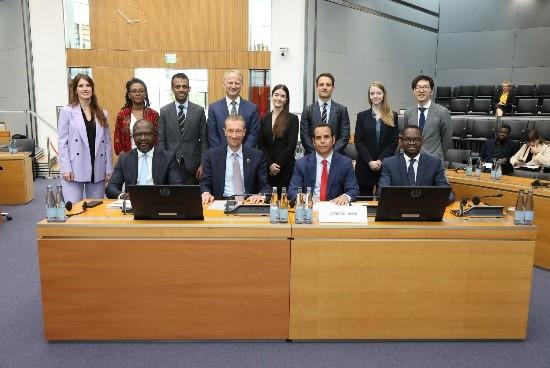Delegation from the African Union Questions International Law and Climate Change at (ITLOS) Oral Hearing
The African Union (AU) delivered a compelling address regarding the interpretation of pertinent provisions of the United Nations Convention on the Law of the Sea (UNCLOS), a detailed exposition of the factual implications of climate change on African Member States and their populations, as well as the distinctive concerns of the continent.

The oral hearings planned by the International Tribunal for the Law of the Sea (ITLOS) which rules exclusively on the United Nations Convention on the Law of the Sea (UNCLOS), have been concluded at the Seat of the Tribunal. Amid various oral statements by countries like Germany, Saudi Arabia, Australia, Bolivia, Chile, Sierra Leone and the Democratic Republic of Congo to list a few and oral statements by organisations like the European Union, Pacific Community (SPC), the Union of Comoros and the International Union for Conservation of Nature and Natural Resources, the African Union (AU) delivered a compelling address on Thursday, 21st of September, 2023 centered on the pressing matter of International Law and Climate Change. The AU, steadfast in its commitment to tackling the paramount challenge of climate change, presented compelling arguments for immediate global action by building on the foundation of the Commission of Small Island States (COSIS) which was established as an international organisation pursuant to the 2021 climate Commission Agreement.
This request, initiated by the COISIS on 12 December 2022, has garnered international attention and positioned the AU as a preeminent intergovernmental organization, representing a coalition of fifty-five member states in Africa. It has played a pivotal role in providing substantial and pertinent information directly pertinent to the queries posed by COSIS, seeking an advisory opinion from the Tribunal.
This comprehensive contribution encompassed the viewpoints of AU regarding the interpretation of pertinent UNCLOS provisions, a detailed exposition of the factual implications of climate change on African Member States and their populations, as well as the distinctive concerns of the continent. These concerns extended beyond the impacts of climate change and its ramifications, encompassing the unilateral economic measures adopted by certain states in their endeavors to combat climate change. In this capacity, the AU efficiently delivered the essential factual and legal information, precisely addressing the questions presented to the Tribunal, as mandated by Article 133, paragraph 2 of the Rules of UNCLOS.
In a significant development underscoring its dedication to addressing climate change head-on, the AU's Office of the Legal Counsel (OLC) submitted a ground-breaking proposal adopted by the AU policy organs.
This pivotal decision represents a formidable stride taken by the AU in the global battle against climate change. It demonstrates the AU's steadfast dedication to combating the far-reaching impacts of climate change, with particular emphasis on its vulnerable island states.
The African Union Delegation was led by Amb. Tordeta Ratebaye, Deputy Chief of Staff, Cabinet of the Chairperson and accompanied by Mr.Mohamed Salem Khalil Boukhari Acting Legal Counsel who were accompanied by a team of SIDLEY Austin LLP, namely Lockhart, Nicolas J.S. and Deepak Raju as well as Professor Mamadou Hebie who meticulously presented a comprehensive oral statement that underscored AU’s dedication to addressing critical environmental issues on the global stage.
H.E. Moussa Faki Mahamat’s keynote address during the Africa Climate Summit, KICC, Nairobi, were documented in the oral proceedings as follows: "African countries are faced with disproportionate burdens and risks, arising from unpredictable meteorological phenomena, notably prolonged droughts and devastating floods at all levels. The resulting humanitarian crises have adverse effects on the economy, health, education, peace, and security..." The quote emphasized the disproportionate burdens and risks that African Member States that are facing as a result of unpredictable meteorological phenomena, most notably prolonged droughts and devastating floods at all levels. These climate-related challenges have led to humanitarian crises that are adversely affecting various aspects of African society, including the economy, health, education, peace, and security.
As the Oral Hearing reached its conclusion on Monday 25 September 2023, the AU Delegation expressed optimism that the International Tribunal for the Law of the Sea would take into account the pressing urgency of the climate crisis when considering potential international legal remedies. They called upon the international community to prioritize decisive climate action and collaborate steadfastly to safeguard our oceans and coastal regions for the well-being of current and future generations.


